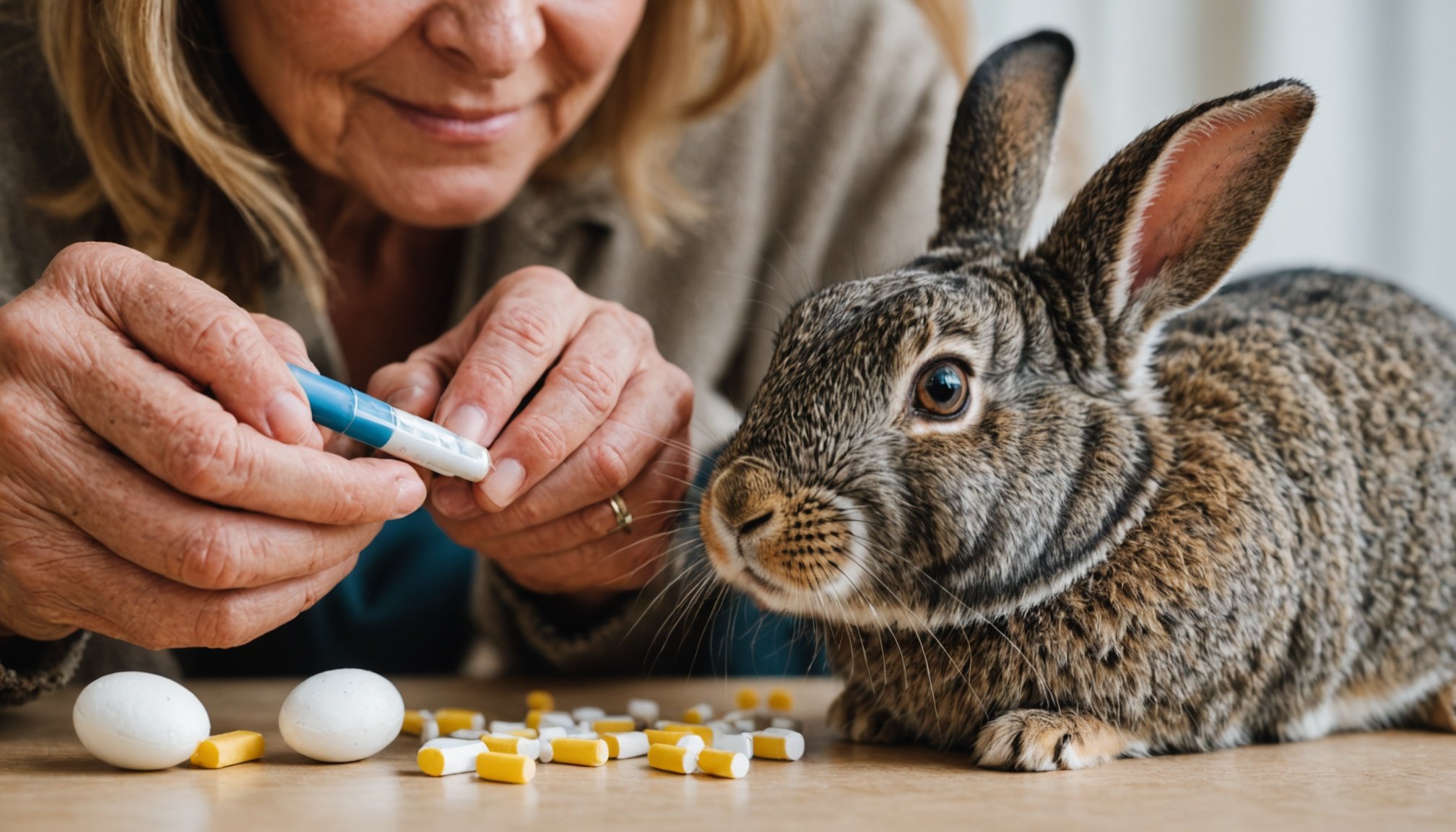Understanding the Importance of Medication Management for Senior Rabbits
Medication management for senior rabbits is crucial due to their unique health needs. As rabbits age, they may develop conditions such as arthritis, dental issues, and weakened immune systems, necessitating tailored medical care. Proper medication administration helps mitigate these health challenges, but improper handling poses significant risks. Mishandling medications can lead to adverse reactions, including internal organ damage or exacerbation of existing health issues.
Regular veterinary consultations play a pivotal role in effective medication management. Vets can provide precise dosages, identify potential side effects, and adjust medications as necessary. They also offer guidance on the best administration methods, catering to each rabbit’s specific health requirements.
In parallel : Ultimate handbook for supporting your pet rat’s respiratory health: expert tips for ensuring their well-being
Furthermore, maintaining an open line of communication with your veterinarian ensures that any changes in your rabbit’s condition are swiftly addressed. This proactive approach not only enhances the quality of life for senior rabbits but also fosters a more predictable and safer medication routine.
Lastly, careful observation and recording of your rabbit’s response to medications is essential. This documentation aids in effective communication with your vet, allowing for fine-tuned adjustments to the medication plan, enhancing the overall management and health of your senior rabbit.
Have you seen this : Delicious low-fat dog treats for a happy and healthy pup!
Step-by-Step Guide to Administering Medication
Successfully administering rabbit medication safely demands diligence and the right techniques.
Oral Medication Techniques
Using syringes or droppers can be effective for oral medications. Hold your rabbit gently but firmly to prevent sudden movements. If using food to hide medication, opt for rabbit-safe treats and avoid sugary items. It’s crucial to keep the environment calm, reducing stress for both you and your rabbit.
Topical Medication Applications
Applying topical medications such as creams or gels requires precision. After application, monitor your rabbit to ensure it doesn’t lick the area, possibly using a protective garment if needed. Check for skin irritation regularly, stopping use and contacting your vet if any adverse reactions occur.
Injectable Medications
Injecting medications requires understanding dosage and safety techniques. Ensure injections are administered in the right location, often the back of the neck or upper leg. Post-injection, monitor your rabbit for signs of discomfort or allergic reactions, and consult your vet if any concerns arise. Consistent observation and care are essential for maintaining your rabbit’s health.
Preparing for Medication Administration
When it comes to preparing for administering medication, careful planning is essential. Begin by assessing your rabbit’s current health status. Understanding their specific needs allows for tailored medication plans. Keep regular records of their condition, noting any changes in their behaviour or appetite.
Before starting, gather all necessary supplies. This includes syringes, droppers, or any other tools required for the medication type. Having everything ready reduces stress for both you and your rabbit. Ensure the medication is stored correctly to maintain its efficacy.
Creating a calming environment is crucial. A quiet, familiar space helps soothe your rabbit, making the process smoother. Consider playing soft music or speaking softly to your pet. Minimising stress is key to successful medication administration.
Moreover, take time to familiarise yourself with the medication’s instructions. Read dosage guidelines carefully to prevent mishandling. Once your rabbit is calm and you are adequately prepared, proceed with the administration process. It’s advisable to follow a consistent routine to help your rabbit feel more secure over time.
These preparation steps are foundational for effective medication management and help ensure your rabbit’s ongoing health and well-being.
Safety Precautions and Monitoring
When it comes to the safety in administering rabbit medication, understanding potential reactions is crucial. Adverse reactions can include lethargy, changes in appetite, or allergic responses. If you observe any unusual symptoms, contact your veterinarian immediately.
Maintaining a precise medication log is vital for accurate tracking. Note each administration, including dosage and time, to effectively monitor your rabbit’s response. This allows for swift identification of patterns or issues that may arise, providing your vet with valuable information for assessment.
Regular follow-up vet visits are also essential for ongoing health assessments. These appointments ensure that your rabbit’s medication regimen remains effective and safe. Adjustments to dosages or methods may be necessary as your rabbit’s health evolves.
By staying vigilant and informed, you can significantly enhance the safety and effectiveness of the medication process. Regular communication with your vet further supports the well-being of your rabbit, ensuring any potential complications are promptly addressed. Through careful monitoring and proactive safety measures, you can help maintain a stable and healthy routine for your senior rabbit.
Overcoming Challenges in Medication Administration
Administering medications to rabbits presents unique challenges. Rabbits often exhibit resistance or fear, complicating the process. Overcoming these challenges requires patience and a gentle approach. Understanding rabbit behavior and employing calming techniques can reduce their anxiety during medication times.
Aggressive behavior may arise if a rabbit feels threatened. To handle this, ensure a safe environment where the rabbit feels secure. Using rewards post-medication can reinforce positive associations, gradually reducing aggressive tendencies. Consistent routine also aids in managing aggression, as predictability lulls anxiety over time.
Consistency in medication adherence is crucial for efficacy and health management. Setting a fixed schedule is vital, promoting reliability which not only benefits health but also creates a reliable routine for your rabbit. Using alarms or reminders can help maintain adherence without overwhelming stress.
Challenges are part of caring for senior rabbits. Addressing these effectively ensures their well-being. Engaging with your veterinarian about any observed difficulties can lead to tailored strategies that fit your rabbit’s personality. Their expertise supports and enhances the handling of medication challenges, ensuring your rabbit lives a healthy, stress-free life. Communication remains key, turning challenges into manageable, routine practices.
Conclusion: The Role of Communication with Your Veterinarian
Effective veterinarian communication for rabbit health is key to successful medication management. Sharing any concerns about your rabbit’s medication with your vet ensures that potential issues are addressed promptly. Never hesitate to voice worries about adverse reactions or unexpected behaviors. Asking questions regarding side effects and behavior allows your veterinarian to adjust treatment plans accurately, prioritising your rabbit’s safety and well-being.
In order to make the most of vet consultations, consider preparing a list of questions beforehand. This ensures that all important topics are covered. Always inquire about possible side effects, interactions with other medications, and behavior changes to watch for. This proactive approach helps in making informed decisions regarding your rabbit’s care.
Utilising additional resources is crucial in providing ongoing rabbit care. Veterinary clinics often offer literature and support groups, which can enhance your understanding of medication management. Online forums and rabbit care communities can also be invaluable, offering shared experiences and advice.
Consistent communication and leveraging available resources empower you to provide the best care for your senior rabbit, ensuring a healthy and stress-free life. Maintaining open dialogue with your veterinarian solidifies a partnership focused on optimal health outcomes.





